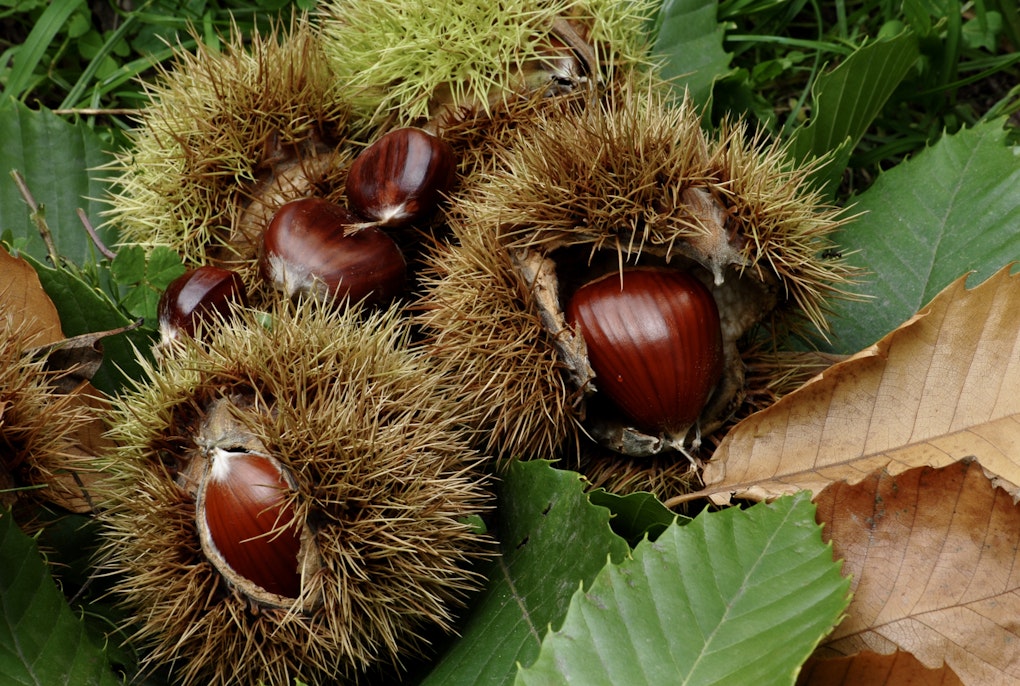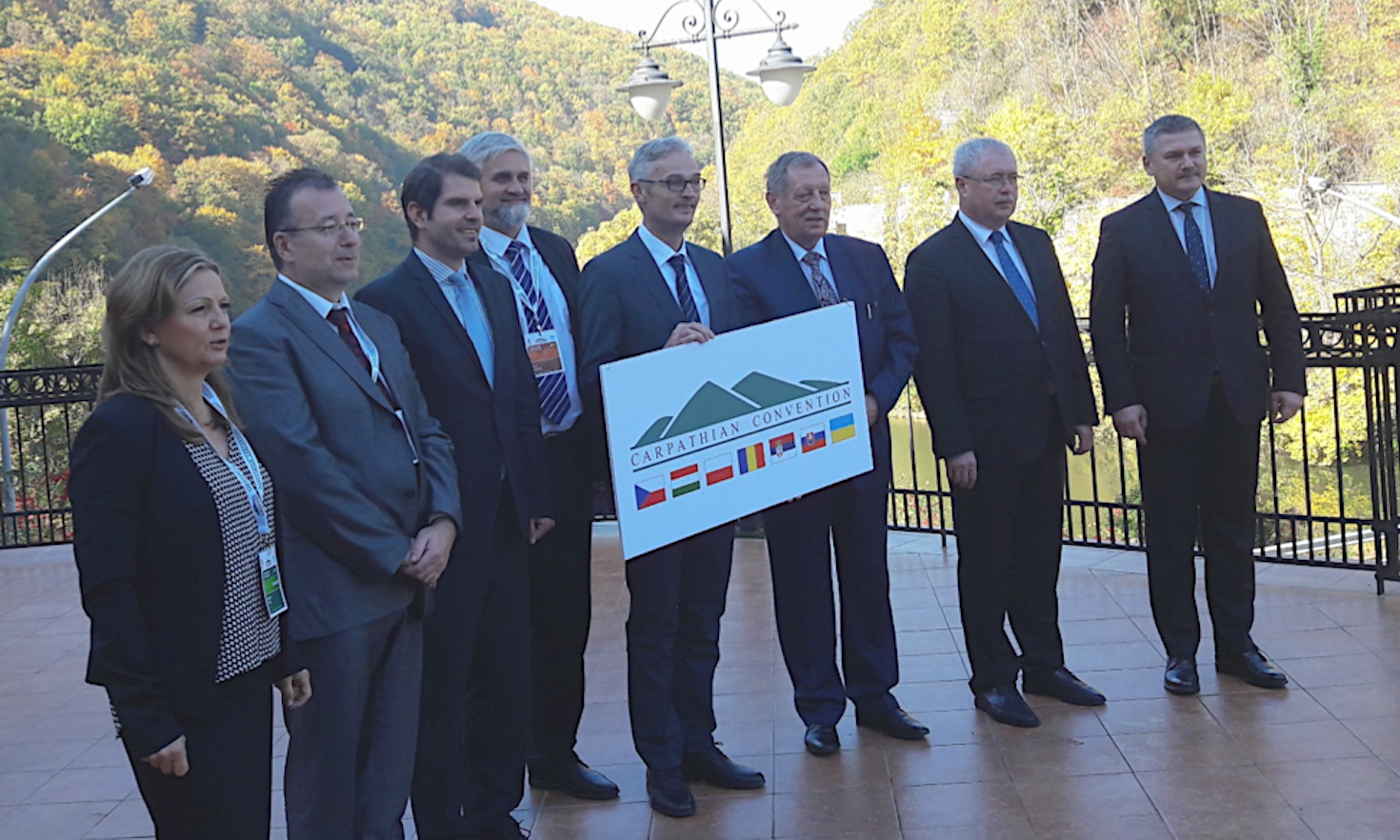
Coltivazione e lavorazione delle castagne
 Ricarda Schmidt
Ricarda Schmidt
Thanks to many years of fruitful collaboration with the Secretariat of the Carpathian Convention, Eurac Research has been awarded as one of the most significant scientific partners for the Convention. Indeed, the Eurac Research Institute for Regional Development was invited to give an active contribution at the Conference of the Parties (COP), the main decision-making body of the Framework Convention on the Protection and Sustainable Development of the Carpathians. There, high-level political representatives from all seven countries (Czech Republic, Hungary, Poland, Romania, Serbia, Republic of Slovakia and the Ukraine) of the Carpathian Convention (CC) participate. The fifth time, since the CC was adopted and signed in Kiev 2003, the meeting took place in Hungary, at the marvelous Park Hotel Palota in Lillafüred, from the 10th to the 12th of October 2017.
Hungary inherits the presidency in the Carpathian Convention
Under the new presidency of Hungary, all the high-level politicians from the seven Carpathian states confirmed the importance and their willingness to collaborate in the Carpathian Convention. At Lillafüred they set the cornerstone for new cooperation and adopted the new article on climate change and the protocol on sustainable agriculture and rural development. New at the COP5 was that the involved experts particularly from Science for Carpathians (S4C), of which C. Hoffmann from Eurac Research is also a member, presented main findings and results of the implemented projects, activities and studies directly to the high-level ministers, the delegations of the Carpathian states and the participating stakeholders and observers. Eurac Research has given meaningful contributions to many of these projects.
The importance of green solutions to sustain Biodiversity in the Carpathians
Concerning the Biodiversity issues, WWF presented the project “Transgreen” dealing with integrated Transport and Green Infrastructure Planning in the Danube-Carpathian Region. Favilli F. and Cavallaro F. from the Eurac Research will participate therein as subcontractors. The contribution of Eurac Research is also foreseen in “Connectgreen”, another project of the Danube Program, which is a follow-up of BioRegio, and deals with ecological corridors. Moreover, the landmark conference on large carnivores in the Czech Republic was mentioned at COP5. Favilli F. from Eurac Research presented his experiences and findings from Alpine and Carpathian projects. A booklet on “Wildlife and Forest Crime in the Danube Carpathian Region” in cooperation with WWF and Eurac Research will be presented on the 22nd of November in the EU Parliament in Brussels to raise awareness on illegal logging, illegal fishing of sturgeon and caviar trade, poaching of large carnivores and illegal killing of wild birds.
Opportunities Sustainable Agriculture and Rural Development (SARD) offers to the Carpathians
A major highlight at the COP5 referred to the Eurac presentation of the SARD Protocol (Sustainable Agriculture and Rural Development). After four protocols tackling biodiversity, sustainable transport, tourism and forest management, SARD aims to create an enabling environment to apply site-specific and sustainable agricultural management and rural development strategies. Commonly, T. Streifeneder, C. Hoffmann and I. DeBortoli from the Eurac Research Institute for Regional Development have drafted the protocol together and on behalf of the CC Secretariat at UNEP Vienna. The final protocol is coherent with the Common Agricultural Policy (CAP) of the EU, can be applied thematically and territorially in a flexible way and puts emphasis on transferring knowledge and exchanging information on good practice examples to raise capacities. It should encourage the parties to design and elaborate projects for European research programs, promote climate smart circular rural economy, agritourism, local products, organic production and rural innovations to foster the topics anchored in the SARD protocol.
Adaptation to Climate Change – the order of the hour in the Carpathians
As mountain regions and hence also the Carpathians are particularly vulnerable to the impacts of climate change, a new Article on Climate Change was integrated as “Article 12bis” to the CC text. The article pursues policies aiming at climate change mitigation and adaptation as well as appropriate implementation measures. In order to support the Countries in adapting to climate change and to help users to access and share data and information on adaptation, the CC supported the European Environmental Agency (EEA) in creating a Carpathian web page under the European Climate Adaptation Platform (CLIMATE-ADAPT). To enlighten the status quo and to give a light foresight, the CC Secretariat has assigned Eurac Research with elaborating the Outlook report on Climate Change Adaptation in the Carpathian Mountains. With the support from UN Environment, Grid Arendal and Szent Istvan University, the three Eurac Research Institutes for Comparative Federalism, Earth Observation and Regional Development analyzed in their synthesis the existing responses on climate change adaptation in the Carpathians. Therein the scientists underlined the still remaining gaps for efficient adaptation and derived recommendations for future necessities.
Never before could the Carpathian Convention show so many initiatives, studies and projects, as were implemented during the Czech presidency. Nevertheless, a remark was given, to accelerate the progressing steps in various sectors to catch up with the Alpine Convention. It is necessary to enhance international networks for becoming more successful in applying for European research programs. Apart from that the CC, which puts its focal points usually on natural science, lacks entrepreneurial and economic but particularly social as well as cultural initiatives. Up to now, their role for releasing the capacities to promote innovative, resilient and inclusive developments in rural areas, is still under-estimated and still not as much considered even in the research agenda of Science for Carpathians.
Author: Christian Hoffmann
Useful links
This content is licensed under a Creative Commons Attribution 4.0 International license.